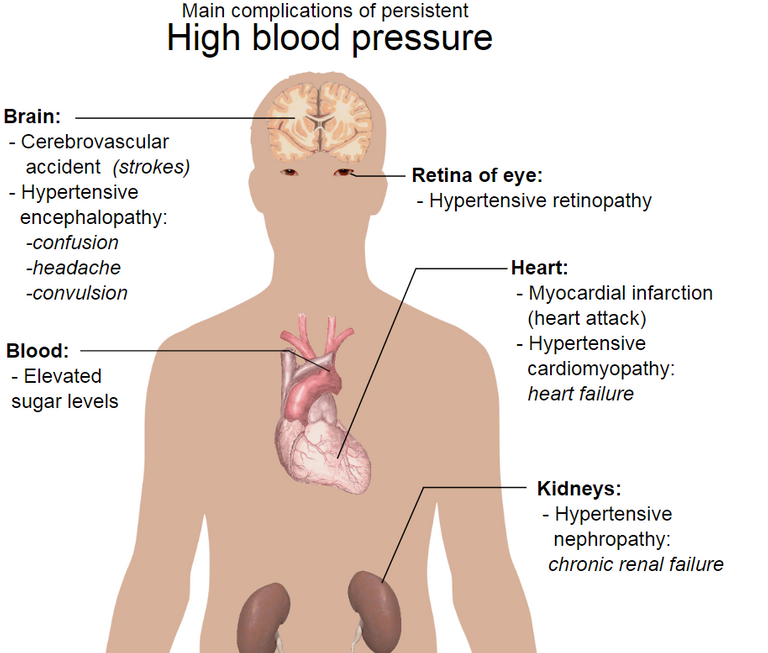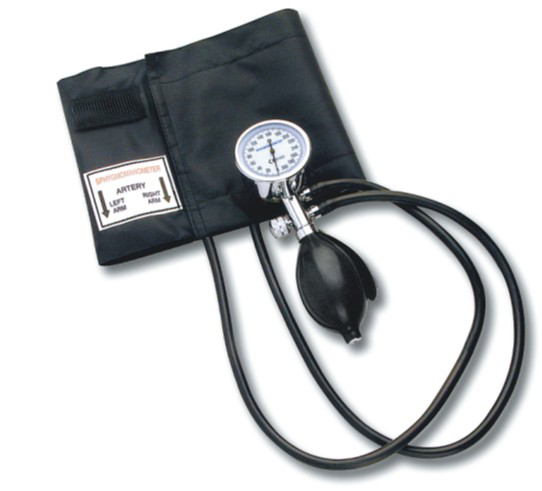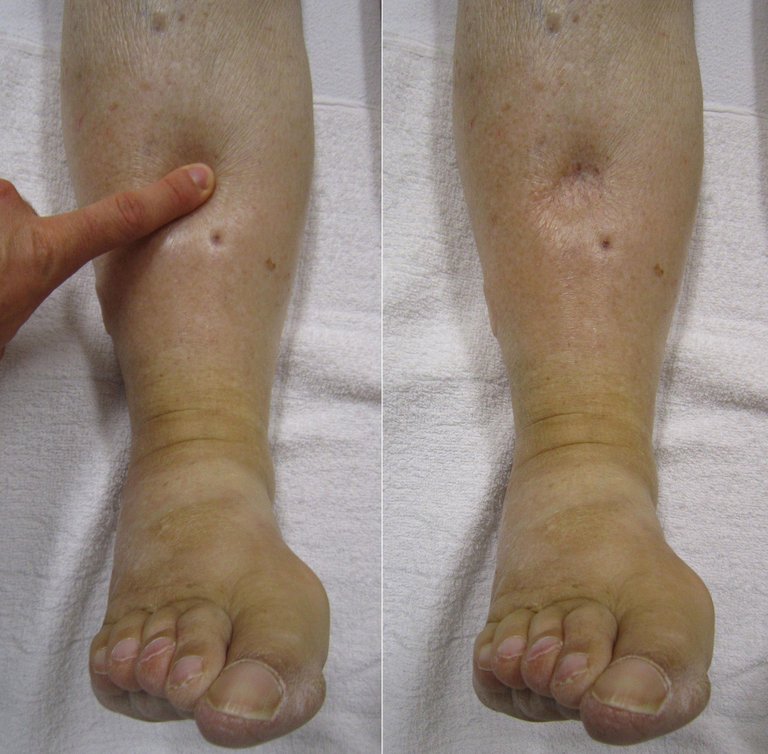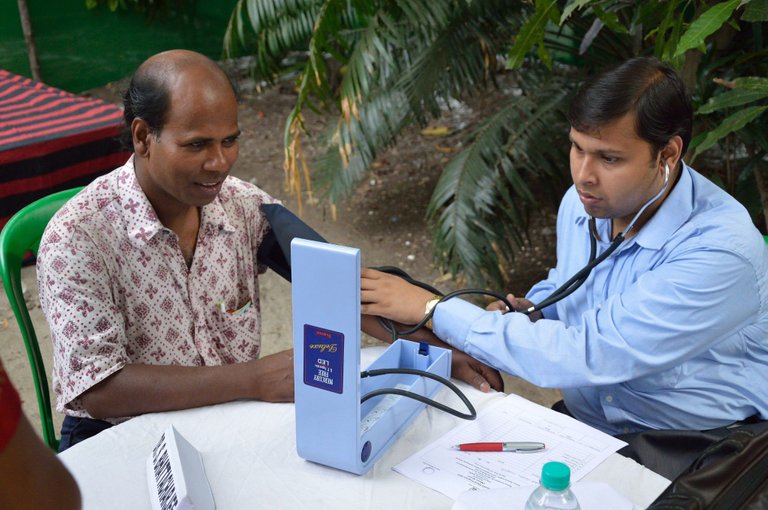HYPERTENSIVE CRISIS

By Mikael Häggström, CC0, Wikimedia
The effective management of hypertension is always a combination of lifestyle modifications and drug therapies which puts the blood pressure under control. However, when this elevated blood pressure is not properly controlled, it can rise to such an extremely high level that it will start damaging the vital organs in the body. This is referred to as a hypertensive crisis.
A person is said to have hypertension when the blood pressure is 140/90 mmHg and above. At this point, the person may not even be aware and there may be no symptoms. For those who have symptoms, it may just be a headache and lightheadedness. If this is not controlled, the blood pressure can rise as high as 220/140 mmHg. At this point, the patient will start experiencing many symptoms due to damage to the vital organs.
Hypertensive crisis can be grouped into Hypertensive urgency and Hypertensive emergency. In Hypertensive urgency, the blood pressure is very high, but there is no ongoing organ damage. But in Hypertensive emergency there is very high blood pressure with associated organ damage. In this discussion, we will focus more on a Hypertensive emergency which is a life-threatening medical emergency that needs intensive care.

By Caremate - Own work, CC BY-SA 3.0, Wikimedia
TARGET ORGANS DAMAGED BY HYPERTENSION
When the blood pressure is highly elevated, certain organs in the body are always the target for damage. We will discuss them one after another.
The first is the brain. A highly elevated blood pressure leads to a condition called Hypertensive encephalopathy. This is damage to the brain caused by a high level of blood pressure. It manifests as an altered level of consciousness, headache, blurring of vision, nausea, and vomiting, convulsions may also occur. Hypertension can also cause the bleeding of the blood vessels in the brain which lead to stroke or bleeding into the sub arachnoid space.
The second target organ damaged by hypertension is the eye. This causes bleeding of the blood vessels that supply the retina of the eye (retinal hemorrhages), papilloedema, and exudates.
Another very important organ damaged by hypertension is the heart. Persistently high level of blood pressure causes heart failure. When the left lower chamber of the heart (left ventricle) is affected, a condition called left ventricular failure, it leads to the accumulation of fluid in the lungs (Pulmonary edema).
Hypertension also affects the heart by reducing the blood supply to the heart which leads to Myocardial Ischemia and Infarction. This condition manifests as chest pain, heart attack, or even cardiac arrest and sudden death.
The kidneys are also important organs damaged by high blood pressure and this result in kidney failure. The manifestation here is that the patient develops a very low urine output and in some cases, there will be no urine at all.
This highly elevated blood pressure also affects pregnant women in a condition known as Eclampsia. They develop leg swelling and convulsions, and in some cases, if the baby is not up to term, the available option will be to terminate the pregnancy to save the mother.

By James Heilman, MD - Own work, CC BY-SA 3.0, Wikimedia
MANAGEMENT OF HYPERTENSIVE CRISIS
When patients come with a hypertensive crisis, it is always a critical condition and something must be done immediately to bring down the blood pressure.
Those who have a hypertensive emergency, are usually admitted to the Intensive Care Unit where their blood pressure is monitored closely. Intravenous antihypertensive drugs are given alongside oral drugs. But for hypertensive urgency, oral rapid-acting antihypertensive drugs are used instead of Intravenous drugs.
The initial goal of blood pressure reduction in these patients is to achieve not more than a 25% reduction in the first 1-2 hours. This is because the vital organs in the body are already conditioned to highly pressure blood supply. Crashing the blood pressure suddenly will lead to a shortage of blood supply to those organs. So, the blood pressure reduction here is gradual and not to achieve normal blood pressure at first.
The blood pressure is monitored regularly and the target in the next 2 - 6 hours will be to bring the blood pressure down to 160/100 or 110 mmHg, and this is maintained for the next 24 hours. Then the patient is converted to oral medications and a normal blood pressure management protocol is instituted to now normalize the blood pressure to below 140/90 mmHg.
This stepwise reduction in blood pressure described here is very important in managing hypertensive crises as suddenly crashing the blood pressure from 220 to 120 will be very fatal to the patient.
RISK FACTORS AND PREVENTION
The most important part of this management is patient education. You must explain to the patient what led to the crisis and how to prevent it, especially non-drug compliance.
One of the common problems that result in this hypertensive crisis is non-drug compliance or abruptly stopping a drug. When patients skip their drugs or don't take the right drug or the right dosage, they are at risk of this crisis. Though it's not easy because these medications are for life, at a point some may get tired. But family and caregivers should always encourage them to keep to their drug schedule to avoid complications. I have seen many instances of people who develop these complications from non-drug compliance.
Lifestyle is also another factor to consider here. In the management of hypertension, there are some lifestyle adjustments that the patient needs to make. Like quitting smoking, excessive alcohol, high fat diet, high salt diet, etc. They are to eat healthy foods, fruits, and vegetables, maintain a healthy weight and exercise regularly. Those who don't follow these lifestyle modifications are at increased risk of this crisis.
Excessive stress, lack of sleep, and use of other recreational drugs can also predispose one to hypertensive crisis. Therefore, those living with hypertension should avoid all these risk factors and causes of hypertensive crises.
In conclusion, hypertension is a long-term condition that when well managed, one can live a normal healthy life. However, one must faithfully follow his diet and lifestyle modifications as well as the drug prescriptions. Non-compliance with these often results in life-threatening crises which usually have poor outcomes.
It is also important to note that hypertension can go on in the body without symptoms until the blood pressure gets extremely high and organ damage sets in. So everyone must check their blood pressure from time to time for early detection and prompt management, especially those at risk. Check your blood pressure today!

By Biswarup Ganguly, CC BY 3.0, Wikimedia
Thanks for reading.
For references and further information on Hypertensive crises, please check the resources below:
Very important for the general public to note. You would be shocked at the amount of emergency, due to uncontrolled blood pressure, that come into hospials.
Exactly. Many persons walk around with asymptomatic high blood pressure. But with blood pressure check, it can be detected early and properly treated.
Thanks for your valuable contribution my dear.
This is an important lecture everyone should have. I was ill about 3weeks ago and when my blood pressure was check the Nurse discovered it was very low she just asked me to follow her to the doctor office. The doctor also give me a short explanation about blood pressure and he admitted me immediately before other test was carried out and I spent 3days in the hospital. Am well now and I take every health information very important.
Thanks to God, I am glad you are fine now.
The blood pressure is always tightly regulated and it's a serious problem when it becomes too high (hypertension) or when it's too low (hypotension).
However, when detected early, it is easily managed. That is why screening and checking of one's blood pressure from time to time is important.
It's very important to check. Thank you for differentiating HYPERTENSION and HYPOTENSION DOC.😬
You're very welcome ma😊. Many thanks 🙌
This is really an eye opener about the dangers and control of hypertension. Thank you for educating us 👏.
Yes, our blood pressure is very important as it affects and damages other organs when it gets dangerously high.
It is important we know about it and as well check our blood pressure from time to time as this damage can go unnoticed for a while.
Thanks so much for reading. I am glad that you found it helpful.
Congratulations @alidickson! You have completed the following achievement on the Hive blockchain and have been rewarded with new badge(s):
Your next target is to reach 900 comments.
You can view your badges on your board and compare yourself to others in the Ranking
If you no longer want to receive notifications, reply to this comment with the word
STOPTo support your work, I also upvoted your post!
Thank you so much @hivebuzz . I am so very grateful for your support 🙏
You're welcome @alidickson, it's well deserved! Congrats on your constant involvement on Hive 😊👍
Thanks for your contribution to the STEMsocial community. Feel free to join us on discord to get to know the rest of us!
Please consider delegating to the @stemsocial account (85% of the curation rewards are returned).
Thanks for including @stemsocial as a beneficiary, which gives you stronger support.
Many thanks @stemsocial . I greatly appreciate your support 🙏
This is really a great pieces.
With this have added some more knowledge to the already known when it comes to high blood pressure.
My mum has been struggling with it for a while now and trust me, it hasn't been something easy but God has always been faithful.
This is something one has to be conversant of and never joke with, time to time medical checkup can save us from a whole lots of complications.
Sadly many people see regular medical checkup as a waste of money simply because they are not sick nor having any symptoms of illness.
Thanks for sharing 🙏 if time permits do drop something on diabetes too. Thank you
Yes, managing chronic conditions like hypertension is not an easy task. May the Lord continue to guide and strengthen your mum in good health and wellbeing.
Regular monitoring is always important as well as drug compliance, diet and lifestyle modifications. Once these things are properly followed, those who have hypertension can live a normal healthy life without any complication.
For more information on diabetes, you can check my previous posts on Diabetic Emergencies and Long term complications of Diabetes Mellitus.
Thanks so much for your wonderful contribution and support. It's well appreciated.
Okay, will check.
Amen 🙏 can you brief me on the ideal diet intake?
And also the lifestyle modification, that sounds new to me
OK. The ideal diet intake for those having hypertension is a low salt diet and diets low in added sugars. They should also limit intake of diets that are high in saturated fats, cholesterol, trans fats, sugary drinks and red meat.
They should eat more of fruits, vegetables and whole grains. Fish, poultry and nuts are also good as well as foods rich in calcium, potassium and magnesium. Drink healthy and clean water.
Life style modifications entails quitting smoking and excessive alcohol intake, for those who take them. Exercise, physical activity and healthy weight is also encouraged, as well as less stress and adequate sleep.
Thanks so much for this piece 🙏 I really appreciate.
You're very welcome ma